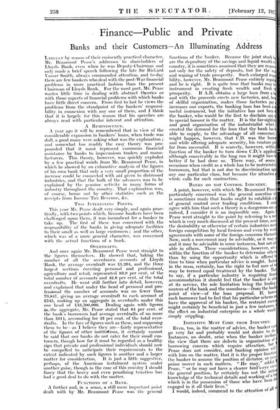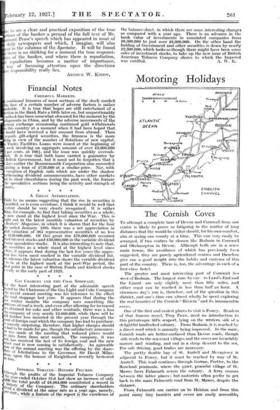Finance—Public and Private
Banks and their Customers—An Illuminating Address LARG ELY by reason of their eminently practical character, Mr. Beaumont Pease's addresses to shareholders of Lloyds Bank, even when he was Deputy-Chairman and only made a brief speech following the late Sir Richard Vassar Smith, always commanded attention, and to-day there are few bankers who deal with the post-War financial problems in more practical fashion than the present Chairman of Lloyds Bank. For the most part, Mr. Pease wastes little time in dealing with abstract theories or with those aspects of financial problems with which banks have little direct concern. From first to last he views the problems from the standpoint of the bankers' responsi- bility. in connexion with any one of them, and I think that it is largely for this reason that his speeches are always read with particular interest and attention.
A REauxiscExcE.
A year ago it will be remembered that in view of the considerable expansion in bankers' loans, when trade was drill, a good many were asking what was the explanation ; and somewhat too readily the easy theory was pro- pounded that it must represent enormous financial assistance by banks to impecunious traders and manu- facturers. This theory, however, was quickly exploded by a few practical words from Mr. Beaumont Pease, in which he showed by an exhaustive analysis of the figures of his own bank that only a very small proportion of the increase could be connected with aid given to distressed industries, and that the bulk of the advances. was to be explained by the genuine activity in many forms of industry throughout the country. That explanation was, of course, borne out by other statistics such as the receipts from Income Tax Revenue, &c.
Two INTERESTING POINTS.
This year Mr. Pease dealt very simply, and again prac- tically, with two points which, because bankers have been challenged upon them, it was incumbent for a banker to take up. The first of these was concerned with the responsibility of the banks in giving adequate facilities to their small as well as large customers ; and the other, which was of a more general character, was concerned with the actual functions of a bank.
OVERDRAFTS.
And once again Mr. Beaumont Pease went straight to the figures themselves. He showed that, 'taking the number of all the overdrawn accounts of Lloyds 'Bank, the average overdraft was £1,204, and the three largest sections covering personal and profeisional, • agriculture and retail, represented 83.9 per cent of the total number of accounts and 42.8 per cent. of the total overdrafts. He went still further into detail, however, and explained that under the head of personal and pro: fessional the number of accounts was no fewer than 79,847, giying an average overdraft to each -account of .4545, making up am aggregate in overdrafts. under this one head of 143,500,000. Dealing again with figures in„the aggregate, Mr. Pease stated that 84 .per cent. of . the bank's borrowers had average overdrafts of no more than 4.614, accounting for 43 per cent. of the total over- drafts. In the face of figures such as these, and supposing them to be—as I believe they are—fairly representative of the figures of other institutions, it certainly cannot be said that our banks do not cater for their small cus- tomers, though how far it must be regarded as a healthy sign that private and professional individuals should now be compelled to anticipate their requirements to the extent indicated by such figures is another and a larger matter for consideration. It is just a little suggestive, perhaps, of the American instalment system under another guise, though in the case of this country I should fancy that the heavy and even penalizing taxation has had a good deal to do with the matter.
FUNCTIONS OF A BANK.
A further and, in a sense, a still more important point dealt with by Mr. Beaumont Pease was the general functions of- the banker. Because the joint. stock bk are the depository of the savings 'and liquid Wealth of country, it is sometimes assumed that they are respaosi not only for the safety of deposits, but for the wax and waning of trade prosperity. Such enlarged respo bility, however, Mr. Beaumont Pease entirely repudi and he is right. It is quite true that banks may be. instrument in creating fresh wealth and fresh tat prosperity. If A.B. obtains a large loan from a ba and with the proceeds erects new factories, and, beat of skilful organization, makes those factories par increases our exports, the banking loan has been a useful instrument, but the initiative has not been the banker, who would be the first to disclaim any to special honour in the matter. It is the far-sightedi and good organization of the industrialist which I created the demand for the loan that the bank has able to supply, to the advantage of all concerned, might happen, however, that C.D. was the bone and while offering adequate security, his venture pro far from successful. It is scarcely, however, within function of the banker to turn down C.D.'s app]ica although conceivably in the long run it might have b better if he had done so. -There may, of amuse, occasions when credit as a whole has to be restricted to borrowers, but that is not due to discrimination ago any one particular class, but because the situation whole calls for such contraction.
BANKS DO NOT CONTROL INDUSTRY.
A point, however, with which Mr. Beaumont Peasea particularly concerned was the general assertion a is sometimes made that banks ought to establish a b of general control over trading conditions. I entn agree with him that such a theory is a dangerous one,a indeed, I consider it is an impossible one. Again.I Pease went straight to the point by referring to a mat which is very much discussed at the present time, nan the desirability or otherwise of certain industries meet foreign competition by local fusions and even by work agreements with some of the foreign concerns thcmsel Now, such a movement may be advisable, or it may a and it may be advisable in some instances, but not ad able in others. These considerations, howeVer, are within the function of the banker to determine othero than by using the opportunity which is offered lo time to time when particular advice is sought. Indt0 in the mass, certainly, has the right to feel sure of id may be termed equal treatment by the banks. Thal to say, if a particular industry is requiring fin0 accommodation it should feel that the banker is alai at its service; the sole limitation being the lending .sources of the bank and. the soundness—from the bank point of view.--of the loan proposal. If, boo each borrower had to feel that his particular scheme an have the approval of his banker, the restraint exercil might certainly be beneficial in just a few instances, 11 the effect on industrial enterprise as a whole would
simply crippling.
INITIATIVE MUST COME FROM INDUSTRY.
Even, too, in the matter of advice, the banker cane go very far and probably would not desire to do Instances, no doubt, arise when the banker inclines the view that there are defects in organization of borrowing concern which require attention, bat., Pease does not consider, and- banking opinion No° with him on the matter, that it is the proper function the banker to assume the position of dictator, or even prime mover in such matters. " He may," added Pease, " or he may not have a clearer bird's-eye view the general position, he certainly has not the inta", knowledge of the technical details and working of a To! which is in the possession of those who have been engaged in it all their lives.". I would, indeed, commend to the attention of h. re to see a clear and practical exposition of the true ions of the banker-a peruial of the full text of Mr. imont Pease's. speech which has appeared in most of daily newspapers and which, I imagine, will also ear in the columns of the Spectator. It will be found there is no shirking for a moment the true responsi- les of the banker, and where there is repudiation, repudiation becomes a matter of importance, way of focussing attention upon the directions re responsibility really lies.
ARTHUR W. KIDDY.











































 Previous page
Previous page